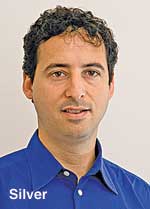Free Press asks White House for a ‘Knight 2.0’ commission
 There’s been more than enough talk about restructuring public broadcasting as digital public media. The time to start walking the walk has arrived.
There’s been more than enough talk about restructuring public broadcasting as digital public media. The time to start walking the walk has arrived.
So says Josh Silver, executive director and co-founder of Free Press, the media reform group that has had a seat at the table in talks about redefining public broadcasting as public media.
Following the release of the Knight Commission and Columbia j-school studies recommending major reforms for publicly supported media, Free Press has asked the Obama administration to appoint a commission to flesh out a legislative proposal. “These are behind-the-scenes conversations and nothing that I can talk about publicly,” Silver said. “It’s too soon and it’s not there yet.”
For pubcasting reform proposals to gain any traction in Washington, advocates need a specific proposal to present to Congress and the public. Silver describes the need for a “high-level, White House-sanctioned commission” to adapt the recommendations of the Knight Commission on the Information Needs of Communities in a Democracy.
The commission, a bipartisan panel that studied the news and information needs of citizens in a digitally networked democracy, called for policies assuring faster and universally available broadband service, digital literacy education and transparency and access to government records and deliberations. It also recommended that public broadcasting move toward a “broader vision of public media.”
“The Knight report is a good starting point for us to start at saying, ‘We need a Knight Commission 2.0,’ ” Silver said. Free Press also agrees with many of the conclusions of “The Reconstruction of American Journalism,” a study commissioned by Columbia University’s Graduate School of Journalism, which offered a more pointed critique of public broadcasting (separate story).
Free Press’s agenda for pubcasting reform includes a substantial increase in federal funding, strengthening firewall protections, diversifying the audience and content and an “expanded definition of what public media is in a digital environment,” Silver said. Cable access TV channels, community radio and low-power FM stations would be among the groups eligible for federal aid under Free Press’s proposal.
“That’s the vision, and I think everyone understands that’s where it needs to go,” Silver said. “The question is whether the community is willing to organize to build the political will that’s required to make it happen and put parochial interests aside.”
Pubcasting’s leaders and institutions are comfortable analyzing the system’s performance and talking about what it could be, Silver said, “but they’re very nervous about advocating for the policy changes that will make that vision a reality.”
“It is an act of Congress that will be needed for the most profound elements of these visions to be realized,” Silver said.
—Karen Everhart
Web page posted Nov. 10, 2009
Copyright 2009 by Current LLC